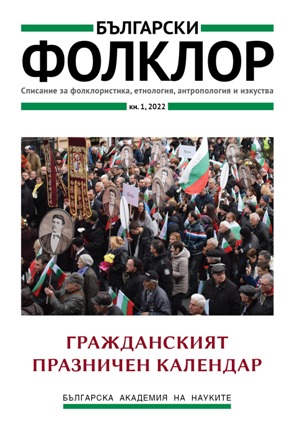За дуалистичния характер на българския граждански празничен календар
On the Dualist Nature of the Bulgarian Civic Festive Calendar
Author(s): Grigor Har. GrigorovSubject(s): Politics / Political Sciences, Politics, History, Anthropology, Social Sciences, Cultural history, Customs / Folklore, Civil Society, Governance, Communication studies, Sociology, Ethnohistory, History of ideas, Political history, Social history, Special Historiographies:, Developing nations, Cultural Anthropology / Ethnology, Culture and social structure , Theory of Communication, Social development, Sociology of Culture, Period(s) of Nation Building, History of Communism, Post-Communist Transformation, Social Norms / Social Control, Sociology of Politics, Politics of History/Memory, Politics and Identity, Identity of Collectives
Published by: Институт за етнология и фолклористика с Етнографски музей при БАН
Keywords: festive calendar; dualism; national holiday; official holidays; ceremonies
Summary/Abstract: The paper puts forward the proposition that today’s Bulgarian civic festive calendar may be examined as a system composed not of individual holidays but of corresponding holiday pairs (3 March – 2 June, St. George’s Day – St. Michael the Archangel’s All Soul’s Day, 24 May – 1 November). The holiday pairs have been formed gradually, and in the course of time a ‘strong’ and a ‘weak’ holiday came to exist, the former – honouring a supreme community value, whereas the latter – paying respect to the memory of the heroes who devoted their lives to its achievement. The paper makes an attempt to substantiate the thesis that dualism is the leading trend in the development of the festive calendar, which might be observed in its past historical stages as well.
Journal: Български фолклор
- Issue Year: XLVIII/2022
- Issue No: 1
- Page Range: 003-027
- Page Count: 25
- Language: Bulgarian
- Content File-PDF

